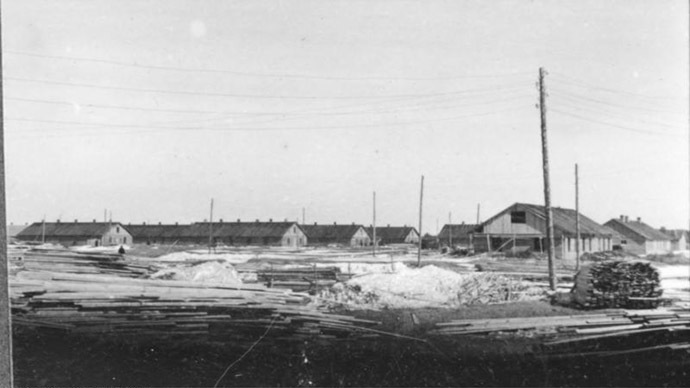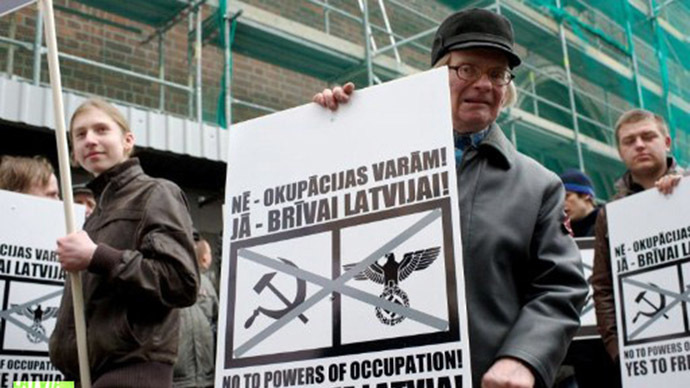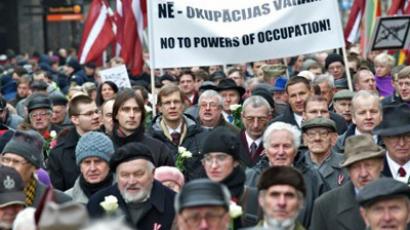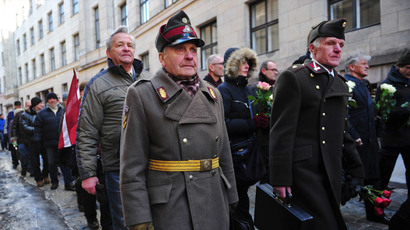Dark past: Latvia blocks Nazi Holocaust exhibition in Paris due to image fears

Latvia has cancelled a Holocaust exhibition in Paris for the fear of tarnishing the country’s image as the Baltic nation currently holds the EU presidency. The exposition was to tell the story of child prisoners at a concentration camp near Riga.
READ MORE: ‘Thank God Nazis shot gays’: Latvian MP in hot water over offensive tweets
The display was organized by historians from Latvia, Russia and Belarus and was scheduled to open on January 25 under the title ‘Hijacked childhood. Victims of Holocaust as seen by the child prisoners of Nazi concentration camp Salaspils.’ Salaspils is southeast of the Latvian capital, Riga.
The exhibition was all set to open its doors, however, there proved to be a last minute hitch: the Latvian delegation to the United Nations Organization for Education, Science and Culture (UNESCO) decided to block the planned project. One of the organizers, the head of a Moscow-based history group, said that the decision was explained by that it would “harm Latvia’s image during its EU presidency.”
“The fact that Latvia’s Permanent Delegation to UNESCO has blocked this exhibition is in my view, a strange and unpleasant surprise for us,” said Aleksandr Dyukov of the Historical Memory Foundation, which was reported by the RIA Novosti news agency.
It is unclear how revealing Nazi crimes could harm Latvia’s present-day image, Dyukov said. The country could only suffer if Latvia looked at the Nazi’s crimes as its own, he added: “The sad fact is that it seems to be that way.”
The exhibition was meant to be an international project with a goal of demonstrating that “no crimes are ever committed against just one nation.”

The Salaspils concentration camp was created at the end of 1941 and was used to imprison Jews and those who came into contact with the Nazi’s around Latvia-Belarus border. The camp was located just 18 kilometers (11 miles) away from Riga.
A source at UNESCO said the exhibition would have consisted of 12 stands with photographs and historic documents. A screen would have also shown accounts of child prisoners.
The decision to cancel was reportedly made during talks with Russia, Belarus and Latvia. The Latvian delegation is said to have asked for the exhibition to be abandoned after it discovered that a Russian citizen considered “persona non grata” in Latvia was one of the members of the exposition’s scientific board, RIA Novosti reported, citing a source at UNESCO.
More than 100,000 people lost their lives in the camp, according to data from the Nuremberg trials protocols. Many perished due to illnesses, intense heavy labor and inhuman treatment.
READ MORE: Riga hosts SS veteran march amid anti-fascist outcry (PHOTOS, VIDEO)
Riga’s stance has been controversial regarding the assessment of its Nazi past. Latvian officials have been criticized for plainly presenting the Nazis as a viable opposition to the Soviets. Parts of the Baltic nation supported pro-Nazi movements in the country while rejecting the Soviet soldiers’ crucial role in World War II.

In 2012, a video was released of two men in Waffen SS uniforms conducting a kindergarten lesson, complete with handouts, grenades and pistols. The class took place on March 16; the day, which commemorates hundreds of Latvians joining the Nazi’s to fight against the Soviet Union during the Second World War.
READ MORE: Bring Nazi to school day? SS lesson at Latvian nursery sparks controversy (VIDEO)
The Latvian legion of the Waffen SS consisted of almost 150,000 Latvians and was split into two divisions. It was among the last of Nazi Germany’s forces to surrender in 1945. There have been annual demonstrations celebrating as well as condemning Waffen SS veterans in recent years.
READ MORE: Latvian ministers boycott march of Waffen-SS veterans
The EU and Russia have added their weight to the debate, criticizing ceremonies commemorating Latvia’s Nazi past.














